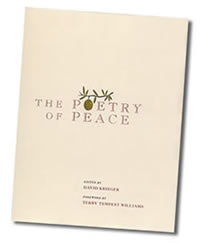The Winners of the 2008 Barbara Mandigo Kelly Peace Poetry Awards
A Light by Which We See
Peace, like poetry, is an act of the imagination
offering us a path toward our highest and
deepest selves.
–Terry Tempest Williams
The Poetry of Peace (Capra Press, 2003)
Fourteen years ago, the Nuclear Age Peace Foundation (NAPF), an international, nonprofit, nonpartisan organization founded in 1982 and headquartered in Santa Barbara, initiated a worldwide poetry contest “to encourage poets to explore and illuminate positive visions of peace and the human spirit.” NAPF president/cofounder and poet David Krieger and cofounder and senior vice-president Frank K. Kelly created the awards to honor Kelly’s late wife, poet Barbara Mandigo Kelly. Their aim was “to get to the core of the spirit of peace.”

The Foundation is pleased to announce that the 2008 Peace Poetry Awards go to Ashley Wellington of New York City (Adult), Jennifer Hu of Hummelstown, Pennsylvania (Youth, ages 13-18), and Xiao Jin Jackson of Mendocino, California (Youth, ages 12 and under).
As poet and novelist Robert Penn Warren once wrote, “The poem is : a light by which we may see,” and this year’s winning poems shed light on the nature of war and of peace. Wellington’s poem, “Gettysburg, Pennsylvania,” addresses the devastating loss of life in a graphic view of the Civil War battle that resulted in 48,000 casualties. Part I of the poem begins:
Even the field, sweating through dusty pores,
Reeked of brass and drying blood
As a cluster of gray coats waited to spill
Out into the open :
A wounded soldier, resting in the shade
Of a cannon, was struck by an officer for sitting down.
The officer later fell from a bullet not shot by his enemy,
And his skull cracked like a clay pot.
The soldier died near him
With outstretched arms and twisted neck,
His trampled carcass stripped to the sinews.
Part II brings us into the present:
You and I stop here :
Probe our fingers into bullet holes
In tree trunks. It is so quiet now,
As if the land, washed clean by so much rain
And stripped for souvenirs,
Wants, impossibly, to be just a field again.
Hu’s poem, titled “the ungodly hour” alludes to the madness of the Salem witch trials. She refers to Giles Corey, who refused to plead guilty as a warlock, and was weighted with stones on an open field until he died. An excerpt of her poem reads:
on a night like that one
weighing on him
like giles corey’s stones
:he hugged his gun
and saw puritans in the village
creeping by the devil
witchcraft in the forest :
maybe there was witchcraft :
because in the morning the land was hell
lit up with mortar rounds
and the devil’s prey
lay strewn on the ground
It is the poem of young Jackson, titled “The Light is Shining on Us,” that offers itself to our imagination as a gift of hope in this season’s longing for peace on earth. In it she writes:
Inside a shooting star are frogs
croaking so loud it’s like an elephant yelling
into a microphone that has a speaker :
Inside a shooting star is peace
trying to make its way to Earth :
Inside a shooting star is light,
light shining on us.
Full texts of these poems and honorable mentions may be found on the NAPF Web site: wagingpeace.org, along with submission guidelines for the 2009 awards. The Poetry of Peace, edited by Krieger, contains the contest winners and honorable mentions for the first seven years of the award and is available through the Foundation. For more information, call 965-3443.



